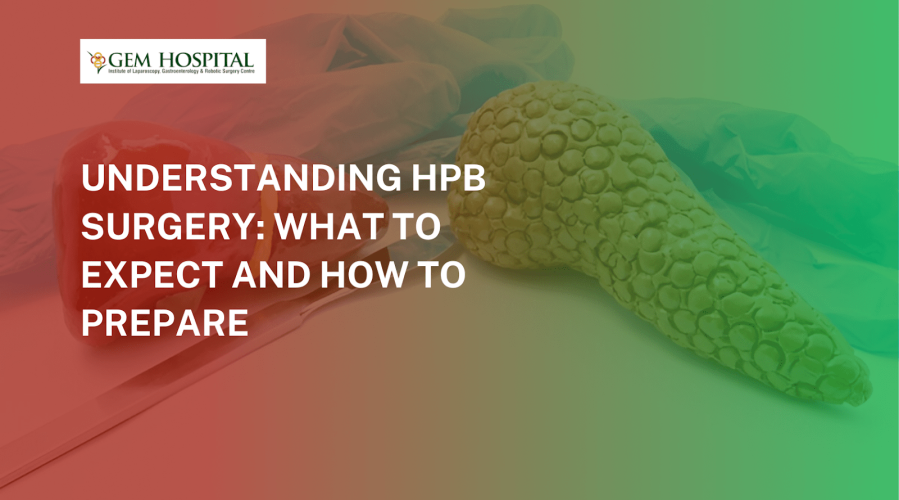Consult experienced hernia doctors in Chennai for expert surgical care. Advanced diagnosis, safe hernia surgery, and faster recovery with specialized treatment.
Understanding HPB Surgery: What to Expect and How to Prepare

Hepato-Pancreato-Biliary (HPB) surgery refers to complex surgical procedures involving the liver, pancreas, gallbladder, and bile ducts. These surgeries are often recommended for treating cancers, benign tumors, cysts, gallstones, and other serious conditions affecting the HPB organs.
If you or your loved one has been advised to undergo HPB surgery, it’s natural to feel anxious. But being informed can significantly reduce fear and improve your confidence. In this guide, we’ll walk you through everything you need to know from understanding the procedure to effective HPB surgery preparation.
What is HPB Surgery?
HPB surgery encompasses any surgery in the liver, pancreas, and biliary system. Some examples of common types include:
- Liver Resection (Hepatectomy):This is the removal of a portion of the liver affected by a tumor and/or disease.
- Whipple Procedure (Pancreaticoduodenectomy): This is a complex surgery typically performed to treat pancreatic or periampullary cancers.
- Biliary Surgery: Treatment of obstruction, stricture, or cancers of the bile duct.
- Gallbladder Surgery (Cholecystectomy): This is the removal of the gallbladder, typically for surgeries related to gallbladder stones or gallbladder inflammation.
These surgeries are only performed by HPB surgeons due to their complexity and because of the critical organs involved.
When is HPB Surgery Recommended?
HPB surgeries may be recommended in the following scenarios:
- Liver tumors (benign or malignant)
- Pancreatic cancer or cysts
- Bile duct strictures or cholangiocarcinoma
- Chronic pancreatitis
- Gallbladder cancer or severe gallstone disease
Because of the high-functioning role these organs play in digestion, blood filtration, and enzyme production, surgical intervention is often life-saving and must be approached with careful planning.
What to Expect Before the Surgery
Proper HPB surgery preparation begins weeks in advance. Here's what typically happens:
1. Comprehensive Diagnostic Evaluation
Your surgeon will recommend imaging tests like:
- MRI / CT scans to understand the tumor’s size and spread
- Endoscopic Ultrasound (EUS) for deeper visualization
- Blood tests to check liver enzymes, pancreatic markers, and overall health
This data helps the surgical team decide whether surgery is feasible and what technique to use.
2. Multidisciplinary Review
At specialized centers like GEM Hospital, a team comprising gastroenterologists, oncologists, radiologists, anesthesiologists, and HPB surgeons come together to plan your treatment. This ensures a holistic and safe approach to surgery.
3. Patient Counseling
Expect to discuss:
- The nature of your disease
- The surgical plan
- Potential risks, complications, and recovery
- Dietary and lifestyle modifications before the operation
HPB Surgery Preparation: Key Steps for Patients
As the date of surgery approaches, taking the right steps will help reduce complications and support a smooth recovery.
1. Nutrition Optimization
Your body needs strength to heal. This requires protein and a well-balanced diet, high in fruits and vegetables. If your dietary intake is decreasing due to varying degrees of weight loss due to disease, the dietitian may recommend nutritional supplements.
2. Stop Smoking and Alcohol
Both alcohol and tobacco negatively impact liver function and healing. Ideally, you should quit smoking and drinking alcohol 2–4 weeks preoperatively.
3. Prehabilitation Exercises
In major surgeries (e.g., liver resection, pancrectomy); your doctor may recommend prehabilitation - which includes mild exercising and stretches for your lungs and muscles to build strength around the time of your surgery (walking, breathing and stretching).
4. Blood Sugar & Co-morbidities Control
If you are diabetic, hypertensive, or suffer from heart or kidney disease, it’s important to get these under control before surgery. Follow your physician’s instructions to a tee during this time.
5. Follow Fasting Instructions
You will be instructed to stop food and water before the surgery, usually 6–8 hours beforehand; this is to minimize aspiration risk during the anesthesia.
What Happens During the Surgery?
HPB surgeries are typically done under general anesthesia and may take 4–10 hours depending on complexity. The procedure may be:
- Open Surgery: Larger incision; common for liver resections or major tumors.
- Laparoscopic (Minimally Invasive): Small incisions, less pain, faster recovery.
- Robotic-assisted: Advanced precision using robotic technology.
Your surgeon will decide the best approach based on your condition.
Post-Surgery: Recovery and Care
After surgery, you may spend a few days in the ICU for close monitoring. Full recovery can take 2 to 8 weeks depending on the type of procedure. Here’s what to expect:
- Pain Management: Pain control via IV medications or epidural.
- Early Mobilization: Encouraged within 24–48 hours to prevent clots.
- Nutritional Support: Gradual shift from liquids to solids.
- Wound Care & Drain Management: Drains may be placed to collect fluids; nurses will train you for home care if needed.
You will also be advised on signs of infection or complications to watch for, such as fever, wound redness, or jaundice.
Emotional and Mental Preparation
Undergoing major surgery can be mentally draining. When facing surgical treatment, it is normal to feel overwhelmed. Talk to your care team if you are feeling especially weighty burdened emotionally, consider how best to access psychological support, and make sure you are well informed. While it is not the only factor, having a positive attitude can greatly help your physical postoperative recovery.
Why Choosing the Right Hospital Matters
Successful HPB surgery is highly influenced by your surgeon's professional skills, the type of multidisciplinary care that's offered, and the hospital's organizational support. Therefore, we suggest you look for a surgical center with a track record of experience with complex surgeries for the liver, pancreas, and biliary systems on which your pre-surgical work up is based.
Your Trusted Partner in HPB Surgery – GEM Hospital
At GEM Ho spital, we have years of experience to prepare you for your surgery with HPB and enable you to recover safely. The expertise of our world-class HPB surgeons, advanced imaging diagnostic capabilities, and minimally invasive procedures will help ensure you are taking the best and safest medical path forward possible.
Whether you have a pancreatic tumor, liver mass, or complex disease of biliary/video duct, GEM Hospital HPB unit provides a surgical plan that is specific to your needs along with whole person care from diagnosis to recovering from surgery.
Now is the time to book an appointment today and move toward quality of life with confidence.
Blogs & Article
Get advanced liver transplant treatment in Chennai with expert surgeons, modern technology, and comprehensive care for safe and successful outcomes.
Get advanced piles treatment in Erode with expert doctors. Safe procedures, modern technology, and effective care for fast relief and recovery.


